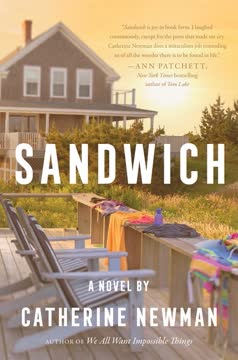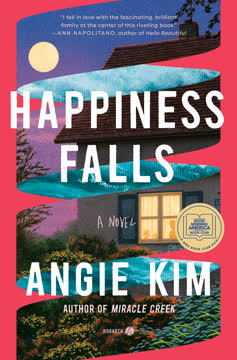Plot Summary
First Notes, Final Dreams
The Van Ness String Quartet's story opens at their conservatory graduation recital, where four young musicians—Jana, Brit, Henry, and Daniel—stand on the precipice of adulthood and artistry. Each is driven by a different hunger: Jana's relentless ambition, Brit's yearning for connection, Henry's prodigious ease, and Daniel's dogged work ethic. Their music is both a promise and a question: can four disparate lives truly harmonize? The performance is a crucible, exposing their insecurities and hopes. The night's afterglow is tinged with rivalry, secret longing, and the first cracks in their unity. The quartet's future is uncertain, but the music binds them, even as the world beckons with solo opportunities, heartbreak, and the lure of greatness.
Quartet of Longings
As the quartet prepares for the prestigious Esterhazy competition, their personal lives become increasingly entangled. Brit and Daniel's secret romance simmers with unspoken needs and inevitable disappointment, while Jana's ambition leads her into a compromising liaison with a judge, Fodorio, in a desperate bid for success. Henry, the group's prodigy, is courted for a solo career, his loyalty wavering. Each member's longing—for love, recognition, or escape—threatens the fragile balance of the ensemble. The music they make together is both a refuge and a battlefield, every rehearsal charged with the tension of what is said and left unsaid. The quartet's unity is tested by the very passions that fuel their artistry.
Ties and Tensions
The group's journey to the Esterhazy competition is marked by mounting pressure and emotional volatility. Jana's leadership is both a source of strength and resentment, as her drive to win eclipses the needs of her friends. Brit's heartbreak over Daniel's emotional distance leaves her adrift, while Daniel's insecurities about money and worth gnaw at his confidence. Henry, ever the golden child, is both envied and isolated by his effortless talent. The competition looms as a crucible, exposing the quartet's vulnerabilities. Their rehearsals are fraught, their friendships fraying. The music, once a source of joy, becomes a test of endurance and trust, as each member wonders if the group can survive the weight of their individual desires.
The Esterhazy Reckoning
At the Esterhazy competition, the quartet's internal fractures become impossible to ignore. Their performance unravels under the strain of personal betrayals and unspoken resentments. Jana's calculated risk with Fodorio yields nothing but shame; Brit and Daniel's unresolved feelings poison their collaboration; Henry's loyalty is tested by outside offers. The group's loss is devastating, not just professionally but personally. In the aftermath, they seek solace in each other, sharing drunken confessions and small acts of care. The failure forces them to confront the limits of their ambition and the cost of their choices. Yet, in their lowest moment, a new resolve emerges: to continue together, not for glory, but for the music and the fragile family they have become.
After the Fall
Reeling from their defeat, the quartet returns to San Francisco, each member nursing wounds both visible and hidden. Jana grapples with guilt and the fear of becoming her mother, while Brit mourns lost love and the absence of family. Daniel buries himself in work, haunted by the specter of failure. Henry, torn between opportunity and loyalty, chooses to stay, at least for now. The group's shared pain becomes a strange kind of glue, binding them through vulnerability. They recommit to their music, not as a means to an end, but as a way to make sense of their lives. The quartet's sound matures, deepened by loss and tempered by forgiveness. Together, they begin to imagine a future beyond disappointment.
New York, New Selves
The quartet relocates to New York, where the city's relentless pace and endless possibilities force each member to confront who they are and who they wish to become. Henry's relationship with Kimiko, a gifted student, leads to unexpected fatherhood and a new understanding of love's demands. Jana and Henry's once-platonic intimacy fades as adult responsibilities take precedence. Daniel's impulsive marriage to Lindsay is both an escape and a trap, while Brit's search for belonging leads her into a steady, if uninspired, relationship with Paul. The group's professional success grows, but so do the complexities of their personal lives. The city becomes a crucible for change, as each member is reshaped by ambition, love, and the inexorable passage of time.
Love, Loss, and Legacy
As the quartet's careers flourish, the realities of adulthood—marriage, children, and loss—reshape their priorities and relationships. Henry and Kimiko navigate the challenges of parenting and partnership, their bond deepened by shared struggle. Jana, ever ambitious, contemplates motherhood through adoption, wrestling with the legacy of her own fractured family. Brit's longing for connection is both fulfilled and complicated by her relationship with Paul, while Daniel's marriage to Lindsay unravels under the weight of unmet expectations. The music they create together becomes a testament to their resilience, a way to honor what they have lost and what they hope to leave behind. Through love and loss, the quartet learns that legacy is built not just on achievement, but on the messy, beautiful work of living.
Fractures and Forgiveness
The passage of years brings both healing and new hurts. The quartet's bonds are tested by jealousy, regret, and the slow erosion of youthful certainty. Jana's struggles with motherhood and self-doubt mirror Brit's quiet dissatisfaction with her life's trajectory. Daniel and Brit's rekindled intimacy threatens the stability of their relationships, while Henry's physical pain foreshadows the end of his performing career. Yet, through candid conversations and shared vulnerability, the group finds forgiveness—for themselves and each other. The music becomes a space for reconciliation, where old wounds are acknowledged and new understandings forged. The quartet's survival depends not on perfection, but on their willingness to accept each other's flaws and to keep playing, together, through the discord.
Family, Found and Made
As biological families fracture or fade, the quartet becomes a chosen family, bound by shared history and mutual care. Jana and Brit's friendship deepens, offering solace and understanding that transcends blood ties. Henry and Kimiko's marriage endures through compromise and acceptance, while Daniel and Brit's partnership is forged in the crucible of loss and renewal. The group's children—Clara, Jack, Daphne—grow up in the shadow of music, inheriting both its gifts and its burdens. The quartet's rehearsals and performances become rituals of belonging, spaces where love is expressed not just in words, but in the act of making something beautiful together. In redefining family, the quartet discovers that kinship is not given, but made, note by note.
The Weight of Ambition
The pursuit of greatness exacts a heavy toll. Jana's ambition, once a source of pride, becomes a burden as she confronts the limits of her own endurance and the cost to those she loves. Henry's prodigious talent is undermined by physical pain, forcing him to choose between career and health. Brit and Daniel, having found each other at last, must reconcile their desires for personal fulfillment with the demands of partnership. The group's collective achievements are hard-won, marked by sacrifice and self-doubt. Yet, in the crucible of ambition, each member gains a deeper knowledge of themselves and what truly matters. The music endures, not as a monument to perfection, but as a record of their striving, their failures, and their hard-earned wisdom.
Breaking and Becoming
Change, once feared, becomes necessary. Henry's decision to leave the quartet is both a rupture and a release, forcing the group to confront the impermanence of all things. Old resentments flare, but are ultimately tempered by gratitude for what they have shared. Jana, Brit, and Daniel must imagine a future without the quartet's original configuration, even as they honor its legacy. The act of letting go—of roles, of dreams, of each other—becomes an act of becoming, a way to make space for new possibilities. The music, once a symbol of unity, now marks the bittersweet beauty of endings. In breaking apart, the quartet discovers the freedom to change, to grow, and to begin again.
The Redwoods Epiphany
A summer festival in the redwoods offers the quartet a moment of reflection and revelation. Amidst towering trees and the company of fellow musicians, they confront the realities of aging, ambition, and the limits of their bodies. Henry's injury signals the end of his performing days, while Jana and Kimiko grapple with the complexities of motherhood and identity. Brit and Daniel, now together, find comfort in the ordinariness of their love. The music they play—new and old—becomes a meditation on change, loss, and the beauty of imperfection. In the hush of the forest, the quartet learns to accept what cannot be changed, to forgive what cannot be undone, and to cherish the fleeting moments of harmony.
Endings and Entrances
As Henry prepares to leave the quartet, the group faces a series of final performances, each one a ritual of parting and remembrance. The music is both elegy and celebration, a way to honor what has been and to welcome what is to come. Daniel and Brit marry, surrounded by friends and family, their union a testament to the enduring power of love and forgiveness. Jana, ever the leader, guides the group through transition, her ambition tempered by wisdom. The quartet's legacy is secured not in accolades, but in the lives they have touched and the bonds they have forged. Every ending is also an entrance, every loss a prelude to something new.
The Last Performance
The quartet's final concert with Henry is both a culmination and a release. The music is suffused with memory, each note a thread connecting past and present. As they play, the group is acutely aware of what they are losing—and what they have gained. The performance is imperfect, marked by missed notes and aching bodies, but it is also transcendent, a testament to the power of persistence and love. In the aftermath, the group mourns what is gone, but also celebrates what remains: friendship, family, and the music that endures. Letting go is both an act of grief and an act of hope, a way to honor the past while making room for the future.
Coda: Perpetual Motion
The story circles back to the quartet's first rehearsal, a chaotic, joyful mess of sound and possibility. In their youthful imperfection, the seeds of everything to come are present: ambition, longing, rivalry, love. The music they make together is both a beginning and an end, a perpetual motion that carries them through triumph and heartbreak, through loss and renewal. The quartet's legacy is not in flawless performance, but in the act of making music together—of choosing, again and again, to play, to listen, to forgive. In the end, it is the music between the notes—the silences, the mistakes, the laughter—that endures.
Characters
Jana
Jana, the quartet's first violinist, is defined by her fierce ambition and uncompromising drive. Raised by a self-absorbed, struggling actress mother, Jana's hunger for success is both a rebellion against and a legacy of her upbringing. She is a natural leader, her authority on stage matched by her emotional intensity off it. Jana's relationships are marked by both intimacy and distance—her platonic closeness with Henry, her complicated friendship with Brit, and her willingness to sacrifice personal happiness for professional achievement. Psychoanalytically, Jana is driven by a fear of failure and a longing for validation, her self-worth inextricably tied to accomplishment. Over time, she confronts the limits of ambition, the cost of control, and the possibility of love beyond achievement, especially as she contemplates motherhood and the meaning of family.
Brit
Brit, the second violinist, is the quartet's emotional heart, her sensitivity and kindness both her strength and her vulnerability. Orphaned young, Brit longs for connection and stability, often seeking it in romantic relationships that leave her unfulfilled. Her playing is marked by nuance and support, content to let others shine while she weaves the threads that hold the group together. Brit's psychoanalytic core is a deep-seated fear of abandonment and a yearning to be chosen. Her journey is one of self-acceptance, learning to value her own needs and desires, and ultimately finding love and partnership with Daniel. Brit's relationships—with Jana, Daniel, and the music itself—are explorations of intimacy, forgiveness, and the courage to claim her place in the world.
Henry
Henry, the violist, is the group's golden child, his prodigious talent both a blessing and a burden. Raised in a loving, supportive family, Henry's ease with music sets him apart, engendering both admiration and resentment. He is generous, warm, and often oblivious to the struggles of those for whom success does not come easily. Henry's psychoanalytic struggle is with the expectations of others and the fear of disappointing those he loves. His relationships—with Kimiko, his children, and the quartet—are marked by a desire to do right by everyone, often at the expense of his own needs. As physical pain threatens his career, Henry must confront the limits of talent, the meaning of sacrifice, and the possibility of a life beyond the stage.
Daniel
Daniel, the cellist, is the quartet's anchor and its most troubled soul. Coming from a background of poverty and emotional neglect, Daniel's drive is fueled by insecurity and a relentless need to prove himself. He is analytical, stubborn, and often emotionally guarded, his relationships marked by ambivalence and self-sabotage. Daniel's psychoanalytic core is a fear of inadequacy and a longing for acceptance, both as a musician and as a man. His journey is one of learning to receive love, to forgive himself, and to find contentment in imperfection. Daniel's eventual partnership with Brit is a hard-won victory, a testament to the possibility of healing and the redemptive power of chosen family.
Kimiko
Kimiko, Henry's partner and a gifted violinist in her own right, is both a mirror and a foil to the quartet's members. Ambitious and disciplined, she struggles with the sacrifices demanded by motherhood and partnership, her own career often sidelined. Kimiko's psychoanalytic struggle is with the tension between self-fulfillment and selflessness, the desire to be both artist and mother. Her relationship with Henry is marked by love, frustration, and a shared understanding of music's demands. Kimiko's journey is one of reclaiming agency, accepting change, and finding meaning in both the music she makes and the family she builds.
Paul
Paul, Brit's long-term partner, represents the allure and limitations of a conventional life. Reliable, kind, and practical, he offers Brit the stability she craves, but ultimately cannot fulfill her deeper needs for passion and understanding. Paul's psychoanalytic role is as a foil to the quartet's intensity, his presence highlighting the costs and rewards of a life devoted to art. His eventual departure is both a loss and a liberation for Brit, allowing her to pursue a more authentic, if riskier, happiness.
Lindsay
Lindsay, Daniel's first wife, is a whirlwind of energy and unpredictability. Her refusal to be contained or defined challenges Daniel's need for control and certainty. Lindsay's psychoanalytic function is as both muse and mirror, reflecting Daniel's own fears and desires. Their marriage, brief and tumultuous, exposes the limits of compatibility and the necessity of self-knowledge. Lindsay's departure is a turning point for Daniel, forcing him to confront his own patterns and to seek a deeper, more lasting connection.
Clara
Clara, Henry and Kimiko's daughter, embodies the next generation's promise and burden. Precocious and musically gifted, she is both a source of pride and anxiety for her parents. Clara's presence in the story highlights the ways in which talent, ambition, and longing are passed down, both as gifts and as challenges. Her observations and actions—sometimes innocent, sometimes disruptive—serve as catalysts for change and reflection among the adults.
Daphne
Daphne, Jana's adopted daughter, represents both the fulfillment and the complexity of Jana's longing for family. Her presence forces Jana to confront her own limitations as a mother and as a person, challenging her to balance ambition with care. Daphne's relationship with the quartet is one of both disruption and renewal, a reminder that love is always a work in progress.
Fodorio
Fodorio, the charismatic violinist and competition judge, is both a symbol of opportunity and a test of integrity. His relationship with Jana is transactional, exposing the moral ambiguities of ambition and the costs of compromise. Fodorio's presence in the story serves as a reminder of the external pressures that shape the quartet's journey, and the ways in which personal and professional boundaries are often blurred.
Plot Devices
Quartet as Microcosm
The central plot device is the string quartet itself, serving as a microcosm for the complexities of human relationships. The narrative structure alternates perspectives among the four members, allowing the reader to experience the same events through different emotional and psychological lenses. The quartet's rehearsals and performances are both literal and metaphorical, stages on which ambition, love, rivalry, and forgiveness are played out. The music they create together is a living record of their evolving dynamics, each note a negotiation between self and other. The ensemble's journey—from hopeful beginnings to painful endings—mirrors the arc of family, friendship, and personal growth.
Time and Memory
The novel employs a nonlinear timeline, moving fluidly between past and present, memory and anticipation. Key events—performances, competitions, losses—are revisited from multiple angles, their meanings shifting as the characters change. Foreshadowing is used to build tension, as early choices reverberate through later chapters. The motif of music as memory recurs throughout, with certain pieces evoking specific moments, emotions, and relationships. The past is never truly past; it is always present in the music, the bodies, and the hearts of the quartet.
Counterpoint and Harmony
The narrative structure mimics the musical concept of counterpoint, with each character's voice distinct yet interdependent. Their stories overlap, diverge, and converge, creating a rich tapestry of experience. Moments of harmony—musical and emotional—are hard-won, the result of negotiation, compromise, and forgiveness. Dissonance is not merely a problem to be solved, but a necessary part of the ensemble's growth. The plot is propelled by the tension between unity and individuality, the constant push and pull of togetherness and solitude.
Physicality and Pain
The novel foregrounds the physical demands of music-making, using the characters' bodies as sites of both power and vulnerability. Injuries, illnesses, and the passage of time are not just obstacles, but catalysts for change. The pain of playing—literal and metaphorical—forces the characters to confront their limits, to make choices about what matters most. The body becomes a symbol of both aspiration and mortality, a reminder that all art is made in the shadow of impermanence.
The Coda
The novel's coda circles back to the quartet's first rehearsal, framing the entire story as a cycle of beginnings and endings. The motif of "perpetual motion" underscores the idea that life, like music, is a series of imperfect attempts, of starting over, of finding beauty in the mess. The coda is both a farewell and an invitation, a reminder that the music goes on, even as the players change.
Analysis
Aja Gabel's The Ensemble is a profound meditation on the nature of ambition, love, and the fragile bonds that hold people together. Through the lens of a string quartet, the novel explores how art both demands and creates intimacy, forcing its practitioners to confront the best and worst in themselves and each other. The story is less about the pursuit of perfection than about the acceptance of imperfection—of missed notes, broken hearts, and the inevitability of change. Gabel's characters are richly drawn, their psychological complexities rendered with empathy and insight. The novel's structure, echoing the counterpoint of chamber music, allows for a nuanced exploration of perspective and memory, revealing how the same events can be experienced in radically different ways. Ultimately, The Ensemble is a celebration of chosen family, of the courage it takes to keep playing together even when harmony seems impossible. Its lesson is both simple and profound: that beauty is found not in flawlessness, but in the act of making something together, again and again, despite—and because of—our human limitations.
Last updated:
Review Summary
The Ensemble received mixed reviews, with an average rating of 3.48 out of 5. Readers praised the beautiful prose, complex characters, and immersive portrayal of the classical music world. Many appreciated the exploration of friendship, art, and personal growth over time. However, some found the pacing slow and characters unlikable. Critics noted excessive introspection and lack of plot development. Music enthusiasts particularly enjoyed the novel's authenticity, while others struggled with the musical references. Overall, the book polarized readers, with some finding it addictive and others tedious.
Similar Books
Download PDF
Download EPUB
.epub digital book format is ideal for reading ebooks on phones, tablets, and e-readers.









